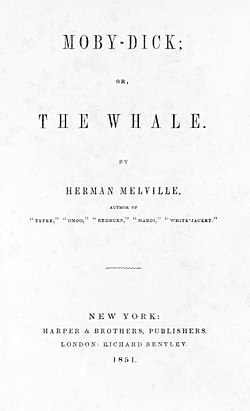**Moby Dick**
In the cannabis lexicon, Moby Dick is a strain that stands out for its impressive lineage and effects. This sativa-dominant hybrid is a cross between the legendary White Widow and the energetic Haze, resulting in a strain that is as formidable as its namesake, the great white whale from Melville’s #1excludeGlossary Known for its towering plants and high THC levels, Moby Dick offers users a potent and euphoric experience, often accompanied by a burst of creativity and energy. The strain’s name has become synonymous with power and intensity in the cannabis community, reflecting its ability to deliver a strong, long-lasting high. As the cannabis industry evolves, Moby Dick continues to be a go-to choice for those seeking a strain that combines potency with a rich, uplifting experience. [Source: Cannabis Now, High Times]
Moby-Dick; or, The Whale is an 1851 epic novel by American writer Herman Melville. The book centers on the sailor Ishmael's narrative of the maniacal quest of Ahab, captain of the whaling ship Pequod, for vengeance against Moby Dick, the giant white sperm whale that bit off his leg on the ship's previous voyage. A contribution to the literature of the American Renaissance, Moby-Dick was published to mixed reviews, was a commercial failure, and was out of print at the time of the author's death in 1891. Its reputation as a Great American Novel was established only in the 20th century, after the 1919 centennial of its author's birth. William Faulkner said he wished he had written the book himself, and D. H. Lawrence called it "one of the strangest and most wonderful books in the world" and "the greatest book of the sea ever written". Its opening sentence, "Call me Ishmael", is among world literature's most famous.
 The cover of the first American edition of Moby-Dick, published in November 1851 | |
| Author | Herman Melville |
|---|---|
| Language | English |
| Genre | |
| Publisher |
|
Publication date | October 18, 1851 (United Kingdom) November 14, 1851 (United States) |
| Publication place | United States |
| Pages | 635 (U.S. edition) |
| 813.3 | |
| LC Class | PZ3.M498 Mo3 |
| Text | Moby-Dick; or, The Whale at Wikisource |
Melville began writing Moby-Dick in February 1850 and finished 18 months later, a year after he had anticipated. Melville drew on his experience as a common sailor from 1841 to 1844, including on whalers, and on wide reading in whaling literature. The white whale is modeled on a notoriously hard-to-catch albino whale Mocha Dick, and the book's ending is based on the sinking of the whaleship Essex in 1820. The detailed and realistic descriptions of sailing, whale hunting and of extracting whale oil, as well as life aboard ship among a culturally diverse crew, are mixed with exploration of class and social status, good and evil, and the existence of God.
The book's literary influences include Shakespeare, Thomas Carlyle, Sir Thomas Browne and the Bible. In addition to narrative prose, Melville uses styles and literary devices ranging from songs, poetry, and catalogs to Shakespearean stage directions, soliloquies, and asides. In August 1850, with the manuscript perhaps half finished, he met Nathaniel Hawthorne and was deeply impressed by his Mosses from an Old Manse, which he compared to Shakespeare in its cosmic ambitions. This encounter may have inspired him to revise and deepen Moby-Dick, which is dedicated to Hawthorne, "in token of my admiration for his genius".
The book was first published (in three volumes) as The Whale in London in October 1851, and under its definitive title, Moby-Dick; or, The Whale, in a single-volume edition in New York in November. The London publisher, Richard Bentley, censored or changed sensitive passages; Melville made revisions as well, including a last-minute change of the title for the New York edition. The whale, however, appears in the text of both editions as "Moby Dick", without the hyphen. Reviewers in Britain were largely favorable, though some objected that the tale seemed to be told by a narrator who perished with the ship, as the British edition lacked the epilogue recounting Ishmael's survival. American reviewers were more hostile.





